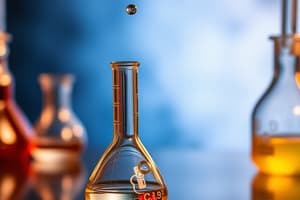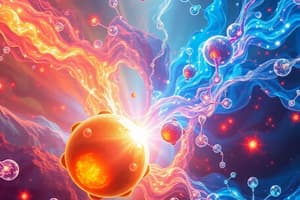Podcast
Questions and Answers
What is a combination reaction?
What is a combination reaction?
- A reaction where two or more products break down to form multiple reactants
- A reaction where a single product combines with multiple reactants
- A reaction where two or more reactants combine to form a single product (correct)
- A reaction where a single reactant breaks down to form multiple products
What type of product is usually formed in a combination reaction?
What type of product is usually formed in a combination reaction?
- Element
- Compound (correct)
- Isotope
- Mixture
How is the general form of a combination reaction represented?
How is the general form of a combination reaction represented?
- \\[AB ightarrow A + B\\] (correct)
- \\[A + B - AB\\]
- \\[AB - A + B\\]
- \\[A - B ightarrow AB\\]
What is typically required for the process of a combination reaction?
What is typically required for the process of a combination reaction?
What happens once the necessary conditions are met for a combination reaction?
What happens once the necessary conditions are met for a combination reaction?
What do combination reactions involve?
What do combination reactions involve?
What is a classic example of a combination reaction?
What is a classic example of a combination reaction?
Which process involves the breaking of the diatomic bonds in hydrogen and oxygen molecules?
Which process involves the breaking of the diatomic bonds in hydrogen and oxygen molecules?
What is another common example of a combination reaction?
What is another common example of a combination reaction?
Which process is a large-scale industrial application of a combination reaction?
Which process is a large-scale industrial application of a combination reaction?
What do combination reactions provide insights into?
What do combination reactions provide insights into?
In what field are combination reactions fundamental?
In what field are combination reactions fundamental?
What do scientists continue to unlock by studying combination reactions?
What do scientists continue to unlock by studying combination reactions?
What does the Haber process produce?
What does the Haber process produce?
What is the result of the rusting of iron?
What is the result of the rusting of iron?
What does understanding combination reactions lead to?
What does understanding combination reactions lead to?
Flashcards are hidden until you start studying
Study Notes
Sure, here's an article about combination reactions:
Understanding Combination Reactions
Chemical reactions are fundamental processes that occur all around us, shaping the world we live in. One of the many types of chemical reactions is the combination reaction. In this article, we'll explore what combination reactions are, how they work, and some real-world examples.
What is a Combination Reaction?
A combination reaction, also known as a synthesis reaction, is a type of chemical reaction where two or more reactants combine to form a single product. The general form of a combination reaction can be represented as:
[A + B \rightarrow AB]
In this equation, A and B are the reactants, and AB is the product. The reactants can be elements or compounds, and the product is usually a compound. This type of reaction is characterized by the coming together of different elements or compounds to form a new substance.
How Do Combination Reactions Work?
Combination reactions typically involve the transfer of electrons or the rearrangement of atoms to form the product. This process often requires the input of energy in the form of heat, light, or electricity. Once the reactants are brought together and the necessary conditions are met, the chemical bonds between the atoms are broken and new bonds are formed, resulting in the creation of the product.
For example, the combination of hydrogen gas ((H_2)) and oxygen gas ((O_2)) to form water ((H_2O)) is a classic example of a combination reaction. This process involves the breaking of the diatomic bonds in hydrogen and oxygen molecules, followed by the formation of new bonds to produce water.
Real-World Examples of Combination Reactions
-
Formation of Water: As mentioned earlier, the formation of water through the combination of hydrogen and oxygen is a prime example of a combination reaction. This process is not only of great importance in understanding chemical reactions but also plays a crucial role in our daily lives, such as in the operation of fuel cells.
-
Rust Formation: The rusting of iron is another common example of a combination reaction. When iron reacts with oxygen and moisture in the air, it forms iron oxide, commonly known as rust. This process is a combination reaction that demonstrates the reactivity of iron with oxygen.
-
Formation of Ammonia: The Haber process, which is used to produce ammonia ((NH_3)) from nitrogen and hydrogen, is a large-scale industrial application of a combination reaction. This reaction is vital in the production of fertilizers and plays a significant role in agricultural practices worldwide.
Importance of Combination Reactions
Understanding combination reactions is crucial in various scientific and industrial fields. These reactions are not only essential in the production of numerous substances but also provide insights into the behavior of different elements and compounds. Additionally, they are fundamental in the study of chemical kinetics and thermodynamics, offering valuable information about the rates and energy changes associated with chemical reactions.
In conclusion, combination reactions are fundamental processes in chemistry, playing a vital role in the formation of new substances and the functioning of various natural and industrial systems. By studying and understanding these reactions, scientists and researchers continue to unlock the potential of chemical transformations, leading to advancements in diverse areas, from materials science to environmental sustainability.
I hope you find this article helpful and informative! If you need further information or have any specific questions, feel free to ask.
Studying That Suits You
Use AI to generate personalized quizzes and flashcards to suit your learning preferences.




